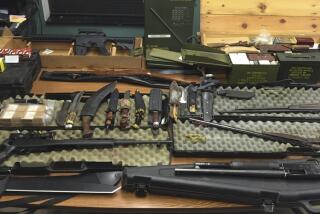Many weapons in Iraq are missing, report says
WASHINGTON — Thousands of weapons the United States has provided to Iraqi security forces cannot be accounted for, and spare parts and repair manuals are unavailable for many others, a new report to Congress says.
The report was prepared at the request of Sen. John W. Warner, chairman of the Armed Services Committee.
A spokesman for Warner said the Virginia Republican read the report over the weekend in preparation for a meeting today with Stuart W. Bowen Jr., the special inspector general for Iraq reconstruction.
The Pentagon cannot account for 14,030 weapons -- almost 4% of the semiautomatic pistols, assault rifles, machine guns, rocket-propelled-grenade launchers and other weapons it has been supplying to Iraq since the end of 2003.
The missing weapons cannot be tracked easily: The Defense Department registered the serial numbers of only about 10,000 of the 370,251 weapons it provided -- less than 3%.
Missing from the department’s inventory were 13,180 semiautomatic pistols, 751 assault rifles and 99 machine guns.
Many weapons that are not missing cannot be repaired because parts or technical manuals are unavailable.
The inspector general’s office released its report Sunday in a series of three audits.
A second audit says that “significant challenges remain that put at risk” the U.S. military’s goal of strengthening Iraqi security forces by transferring all logistics operations to the Defense Ministry by the end of 2007.
The audit says there is a “significant risk” that the Iraqi Interior Ministry “will not be capable of assuming and sustaining logistics support for the Iraqi local and national police forces in the near term.”
That support includes equipment maintenance, transportation and health resources for soldiers and police.
A third audit says, “The unstable security environment in Iraq touches every aspect” of the Provincial Reconstruction Team program.
The audit says that, because of security issues, the teams “have varying degrees of ability to carry out their missions.” Auditors reviewed nine teams and four satellite offices and found that “four were generally able, four were somewhat able, three were less able and two were generally unable” to accomplish their goals.
More to Read
Sign up for Essential California
The most important California stories and recommendations in your inbox every morning.
You may occasionally receive promotional content from the Los Angeles Times.










